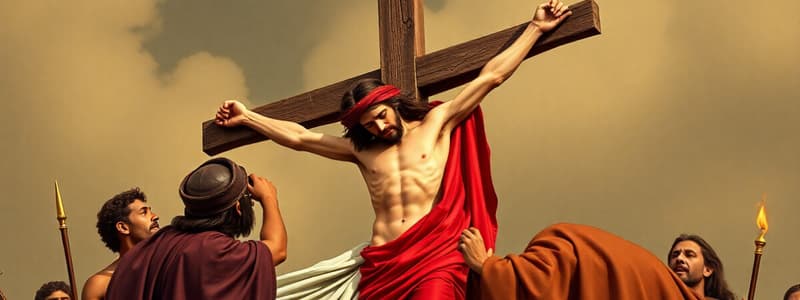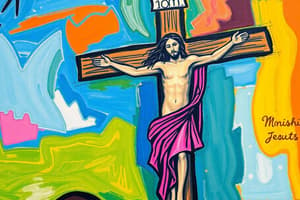Podcast
Questions and Answers
What political concern did the Jewish leaders have regarding Jesus?
What political concern did the Jewish leaders have regarding Jesus?
- His miracles were causing unrest among the Roman soldiers.
- Jesus was forming a military group to challenge Roman authority.
- He was evading Roman taxes and encouraging others to do the same.
- His growing popularity threatened their limited authority. (correct)
Why was Jesus' interaction with sinners and Gentiles considered problematic?
Why was Jesus' interaction with sinners and Gentiles considered problematic?
- It was perceived as a direct assault on Roman cultural practices.
- It was believed to encourage idolatry among the Jews.
- It was seen as undermining Jewish social norms. (correct)
- It led to increased pollution and disease in Jewish neighborhoods.
What was the religious leaders' accusation of blasphemy based on?
What was the religious leaders' accusation of blasphemy based on?
- Jesus claimed to be a prophet sent by an unknown deity.
- Jesus denied the existence of heaven and hell.
- Jesus made claims to divine authority and defied religious authorities. (correct)
- Jesus encouraged his followers to destroy the temple.
What event led to speculation about Jesus' return to Jerusalem?
What event led to speculation about Jesus' return to Jerusalem?
In what way did Jesus allegedly violate Jewish law?
In what way did Jesus allegedly violate Jewish law?
Flashcards
Political Reason for Jesus' Trial
Political Reason for Jesus' Trial
Jesus' popularity threatened the authority of religious leaders, risking their power.
Religious Reason for Jesus' Trial
Religious Reason for Jesus' Trial
Jesus was accused of violating Jewish laws on the Sabbath and purity.
Blasphemy
Blasphemy
Defiance against religious authorities and claims of divinity seen as blasphemous.
Raising of Lazarus
Raising of Lazarus
Signup and view all the flashcards
Passover Context
Passover Context
Signup and view all the flashcards
Study Notes
Reasons for Jesus' Death
- Three main reasons for Jesus' enemies wanting to kill him: political, religious, and blasphemous
- Political: Jesus' popularity with the people threatened the religious establishment's authority, and the Romans might intervene. Caiaphas expressed this concern.
- Religious: Jesus disregarded Jewish law, e.g., healing on the Sabbath, associating with sinners and Samaritans.
- Blasphemous: Jesus claimed authority equal to, or greater than, ordained religious teachers, implying divinity and blasphemy. He claimed God as his Father and claimed divinity.
Lazarus
- Jesus raised Lazarus from the dead.
- This act resulted in the mob's belief that Jesus was a threat.
Political Concerns
- Jesus' popularity threatened the limited authority of the religious establishment (Sanhedrin)
- Roman concern about the potential for unrest due to religious leaders
- Fear of Roman intervention, if provoked by the religious conflicts
- Potential for a wider unrest, leading to Roman intervention and likely removal of all Jewish leaders
Religious Concerns
- Jesus disregarded Jewish law concerning Sabbath violations, healing on the Sabbath, mingling with sinners and Samaritans.
- Ignoring established ritual purification rules
- Implied blasphemy due to differing interpretation of the Law
Blasphemy
- Accusations of blasphemy stemmed in part from Jesus' claim of godliness
- Jesus' teachings and actions challenged existing religious authorities.
- Jesus' claims of direct communication with God were viewed as blasphemous.
- Jesus' perceived audacious pretenses to divinity were viewed as intolerable and inexcusable.
Studying That Suits You
Use AI to generate personalized quizzes and flashcards to suit your learning preferences.





